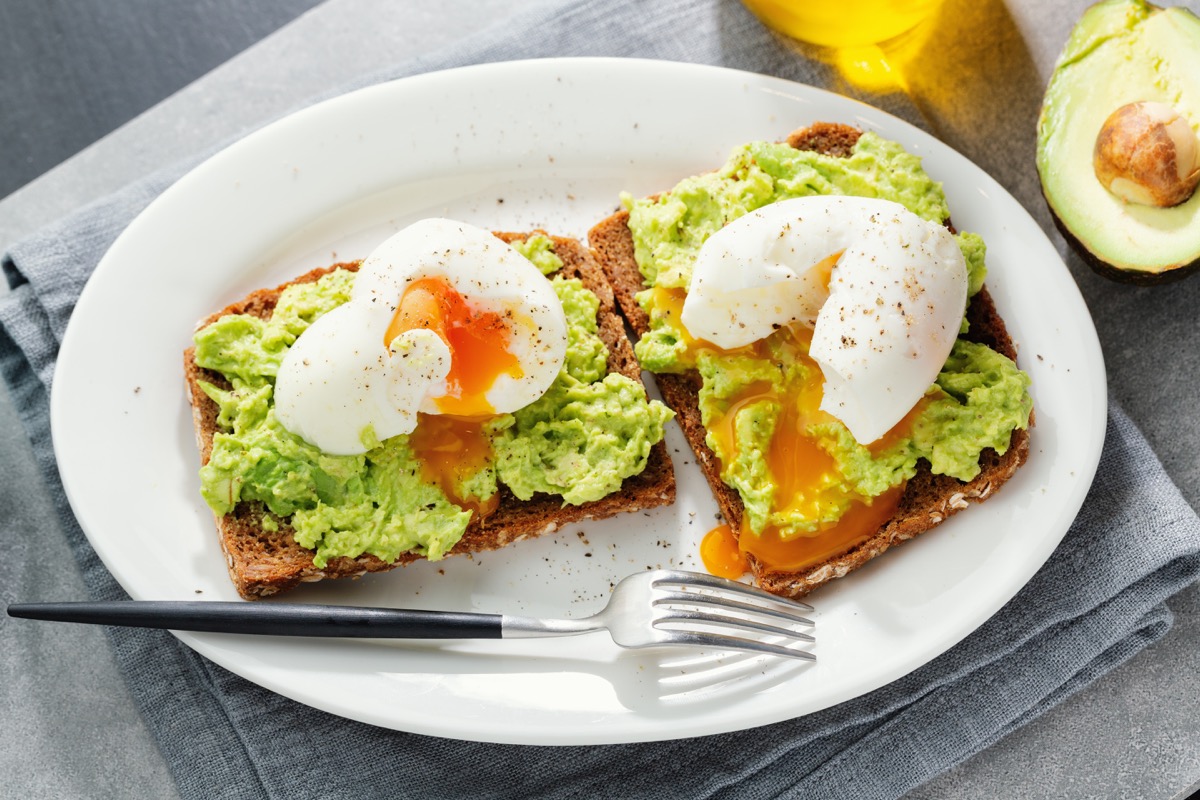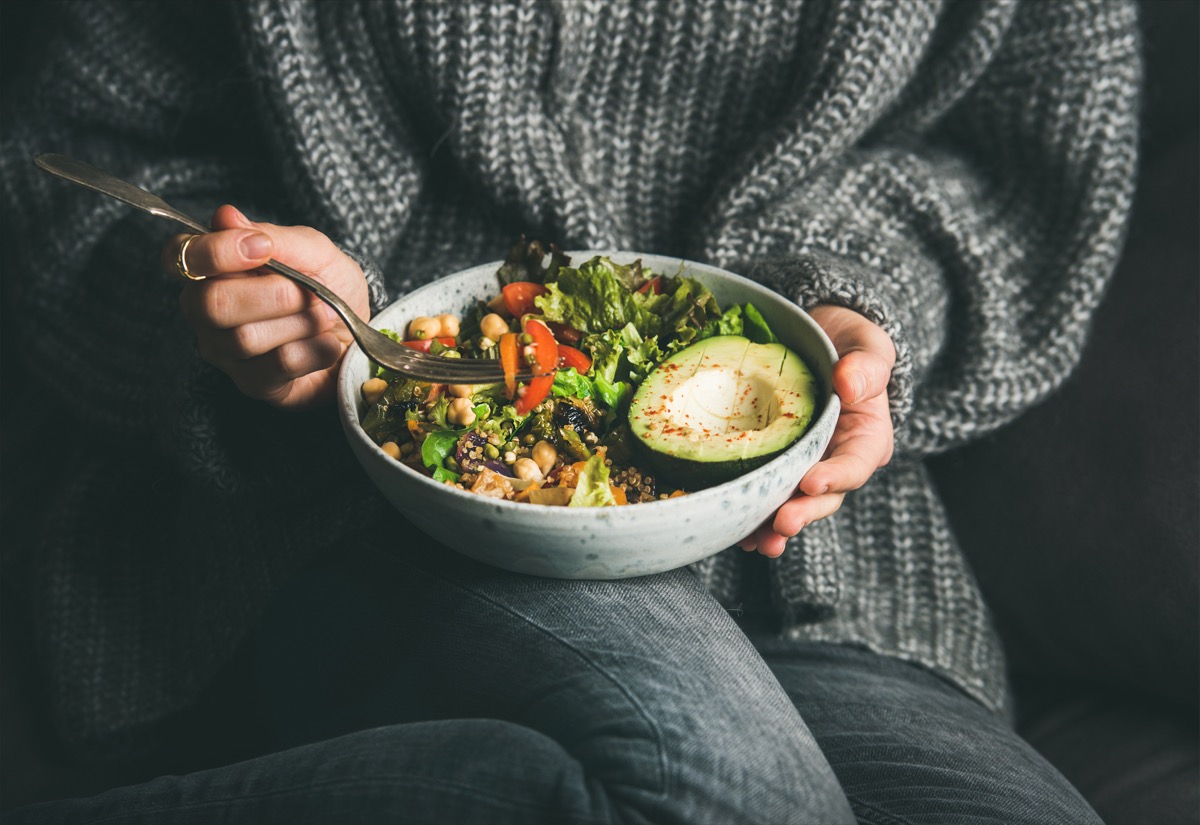10 Effective Ways to Motivate Yourself to Eat Healthier

There’s no shortage of reasons that eating healthier is a worthwhile pursuit. Besides helping you manage your weight, eating a healthy diet can lengthen your life by slashing your risk of type 2 diabetes, cardiovascular disease, certain types of cancer, and more. That said, it can still be a challenge: We decide to eat healthier, do our best to follow the plan, and then eventually lose our resolve and revert to old eating patterns before any real progress is made. Experts say that true success hinges on our ability to push past that initial inspiration to make a more meaningful, sustained effort. Ready to finally make a lasting change? Read on to learn how to motivate yourself to eat healthier, according to wellness coaches and nutrition experts.
RELATED: 11 “Healthy” Habits That Are Making You Gain Weight.
1
Write down some SMART goals.

The first thing you should do when starting a new healthy eating plan is to write down a list of SMART goals, says Bryan Davis, a NASM-certified nutrition coach. These are goals that are specific, measurable, achievable, relevant, and time-bound.
While many people measure their success by aiming for a particular number on the scale, experts suggest creating goals surrounding your habits instead. For instance, you might decide you’d like to eat two cups of leafy greens daily or limit processed snacks to once per week—two healthy habits that would likely lead to weight loss and better overall health.
You can keep track of how it’s going by checking off each goal every day as you achieve it. At the end of the week, look back over your progress to celebrate your successes and find areas in need of improvement.
2
Purge unhealthy items from your kitchen.

When you first decide you’re ready to eat healthier, it’s oftentimes easier to overhaul your kitchen than to upend your diet itself. By purging unhealthy items from your fridge, cabinets, and pantry, you’ll set yourself up for success by aligning your environment with your goals. That’s why Mona Kirstein, PhD, a certified holistic health and wellness coach, suggests starting any new healthy eating plan with a kitchen makeover.
“Clear out all those tempting treats and processed snacks and restock your shelves with fresh, wholesome foods instead. Fill your fridge and cabinets with fruits, veggies, beans, nuts, seeds, and whole grains,” she tells Best Life. “When the healthy choice becomes the easy choice, you’ll reach for nutritious options without even thinking about it. Removing unhealthy items eliminates temptation and constant cues to eat poorly.”
RELATED: 15 Life-Changing Habits to Add to Your Wellness Routine.
3
Explore healthy ingredient substitutions.

To diet is to deny yourself the foods you love—and diets almost never work long-term. Instead of focusing on restriction, try swapping out unhealthy ingredients for healthier alternatives, the experts suggest. That way, you can still enjoy many of your favorite dishes without feeling like you’re missing out—or worse, burning out.
“Swap butter and oil for unsweetened applesauce or pumpkin puree in baked goods. Blend frozen bananas into creamy nice cream instead of eating regular higher-fat ice cream. And top salads with toasted chickpeas rather than croutons for added crunch and protein,” Kirstein suggests. “Knowing you can have a healthier version of a craving-satisfying indulgence makes it easier to motivate yourself to eat better overall.”
4
Know your “why.”

Vered DeLeeuw, a Memphis-based certified nutrition coach and healthy recipe blogger, says that in order to stay motivated, it’s also important to dig deep and understand why you want to eat healthier. This has been the single greatest motivator in her own household, she says.
“For my husband and me, it was watching my husband’s blood sugar climb steadily and reach the point of pre-diabetes,” she tells Best Life. “The low-carb diet has been wonderful for him, and we’re grateful for that. This very powerful ‘why’ is what has kept us on the straight and narrow almost every single day for the past 12 years. What is your why?”
RELATED: 5 Signs You Aren’t Eating Enough Leafy Greens, Nutritionists Say.
5
Maintain a food journal.

Keeping track of certain data from your meals can be another way to motivate yourself to eat healthy foods. This might include food types, portion sizes, information on macronutrients, or anything else that helps you stay on track.
“Grab a notebook and start writing down everything you eat and drink every day. Recording meals and snacks in a food journal increases awareness regarding your eating habits,” says Kirstein. “Accountability is key for making positive changes. The act of documenting your intake helps you stay motivated to reach nutrition goals.”
6
Try new recipes.

Eating healthy food doesn’t have to mean sacrificing flavor. In fact, your newfound interest in healthy eating could help spark a love of cooking.
“Seek out exciting healthy recipes and find nutritious meals you love eating. Incorporate more color, flavors, and textures to enhance nutrition and satisfaction,” suggests Kirstein. “Discovering tasty, fun recipes makes healthy eating enjoyable rather than a chore, which is essential for staying motivated.”
RELATED: 4 Best Ways to Lose Weight (Without Using Ozempic).
7
Plan your meals each week.

Planning your meals ahead of time can also help take the guesswork out of mealtime. This will make you less likely to make impulsive eating decisions.
“Don’t allow yourself to come home at 6 p.m. with no plan for dinner,” says DeLeeuw. “It’s best to have a plan for the week and pre-cook some of your meals once or twice a week, then portion and refrigerate or freeze them.”
8
Don’t dwell on what you can’t eat.

When sticking to a healthy eating plan, it can be easy to get tunnel vision about the foods that aren’t on the menu. However, DeLeeuw says you should try to focus on all the delicious food you can eat rather than getting caught up on your restrictions.
“My college-age daughter recently started eating paleo-style,” the nutrition coach says. “This morning, she sent me a photo of her delicious breakfast: two eggs fried in butter, a roasted sweet potato, and a gorgeous ripe avocado. She said, ‘How can I possibly miss eating donuts when this meal is so delicious, satiating, and leaves me feeling good and energized for hours!'”
RELATED: 12 Best Foods to Ease Anxiety, Experts Say.
9
Start small.

Davis says that if you’re first committing to a healthy eating routine, it’s wise to start small by choosing a few key habits that you’d like to address. For instance, you can begin by eating many of the same foods, but changing your portion sizes by eating off of smaller plates. Alternatively, you could start by shifting the proportions on your plate and featuring vegetables as the main course and minimizing meat as a side dish.
“I recommend people make small changes instead of totally redoing their nutrition,” explains Davis. “If someone has been overeating for years or not eating healthy, asking them to all of a sudden make a switch is going to be hard to stick to. Break it down into small, achievable steps.”
10
Use non-food rewards.

Finally, you can motivate yourself to eat healthier by using non-food rewards to celebrate meeting your goals. For instance, if you successfully stick to your plan for a week, you might take yourself out to see a movie in the theater or splurge on a new nail polish that you might not otherwise buy. When you meet bigger goals—for instance, sticking to your plan for a month—give yourself an even bigger reward.
These are especially effective if they are oriented toward self-care, or address the impulses that might cause overeating or unhealthy eating patterns. For instance, if you find that you eat unhealthily as a means of soothing stress, getting a massage for every healthy eating week can help reward your good behavior while also helping the underlying issue.
For more wellness tips sent directly to your inbox, sign up for our daily newsletter.
Best Life offers the most up-to-date information from top experts, new research, and health agencies, but our content is not meant to be a substitute for professional guidance. If you have health questions or concerns, always consult your healthcare provider directly.